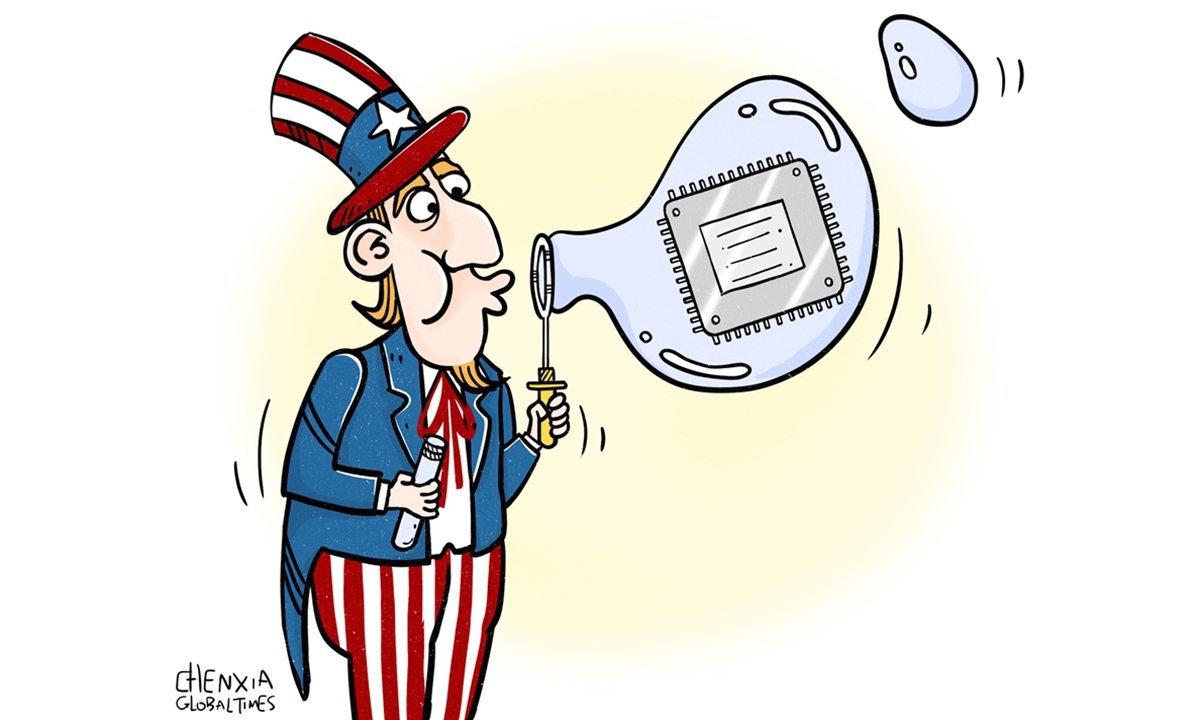
Illustration: Chen Xia/Global Times
US President Joe Bide signed the CHIPS and Science Act of 2022, also known as the CHIPS Act, into law on Tuesday. The act had been in the making for quite a long time and was long under the spotlight of public opinion both in the US and around the world.
Despite of the polarization and severe confrontation between the two US political parties, the bill was passed. This was mainly due to the act's blatant characteristic - targeting China, which touches upon one of the very few remaining bipartisan consensus between the Democratic and Republican parties.
As the title suggests, the two major parts of the act are about chips and science. The bill will provide about $52 billion in government subsidies for US semiconductor production and an investment tax credit for chip plants. The legislation also authorizes about $200 billion over 10 years to boost US scientific innovation in fields such as artificial intelligence and quantum computing. This makes the bill seem like a legislation for attracting investment with preferential policies. But many of the clauses in the act expressly restrict relevant chip companies from carrying out normal economic, trade and investment activities in China. This is problematic.
Some American media outlets use "the most" to describe the several thousand pages of the act, such as "this bill is going to have one of the greatest and most far-reaching effects on America that we've ever done," "the most significant and necessary government intervention in the industrial economy in decades," and groundbreaking. Why groundbreaking? The answer is that the US has picked up the industrial policy that it once had severely criticized, added a large number of designs about unilateral administrative interventions in the global market, trade and technology barriers in it, and keeps making economic and scientific issues a matter of politics and security.
The US always puts up a "righteous" face when blaming others, but it looks so natural when it does the "wrong" deeds itself. The U-turn in its attitude toward industrial policy shows that the US can live the way it "hates" the most.
Some people say that the CHIPS Act is the product of the US version of the "all-of-nation system." It needs to be emphasized that it is fundamentally different from China's "all-of-nation system" based on scientific and technological self-reliance and self-improvement.
One of the key directions of the act is to trip up potential competitors, reflecting a despicable mind-set that is caused by Washington's growing lack of self-confidence in the face of Beijing. The situation, to some extent, is like students from one class are studying for their exams, but with ill intentions, one of them tries to cut off the electricity to other students' rooms so that their classmates cannot study at night. This is a way to gain a relative competitive advantage through improper means to worsen others' learning environment. Of course, Washington's actual practices are much worse and more overbearing.
The timing of Washington's passing and signing of the act into law is "coincidentally" before the preliminary meeting of a US-promoted semiconductor alliance known as the "Chip 4." The "Chip 4" is widely regarded as an anti-China small clique in the global semiconductor industry that Washington is attempting to form. Be it the bill or the alliance, they all come with a strong coercive nature - asking others to take sides between China and the US. In a sense, they have gone beyond the scope of ordinary industrial supportive policies, and are more like a set of punches by Washington to "choke the throat of China's development," showing a strong geopolitical sense.
It is obvious that, by taking these measures, Washington attempts to dominate the advantageous position in the global semiconductor supply chain and maximize US' interference and prevention of the development and progression of China's chip industry. But in fact, it is clear what result the US will receive ever since it came up with this idea: Washington's expectations will eventually fall short and go against its own wishes. This is because the US cannot rely on the act, which, in essence, is a "zero-sum game" under a narrow-minded and conservative mentality to destructively reconstruct the pattern of the global semiconductor industry dominated by the market in the era of economic globalization and free trade.
China's semiconductor industry may see the negative impacts caused by the act in the short term. But these effects are not decisive, because they will stimulate a stronger explosive force and lasting dynamics for China to engage in independent innovation. In recent years, there have been many relevant cases. Even the most arrogant US politicians today won't dare to think that China's semiconductor industry will stagnate or even go backward as a result of such a bill from Washington.
The chip industry is highly globalized. Over the past few decades, the division of labor in globalization and the huge market demand are the fundamental conditions for the rapid progress of chip technology. Now, the US wants to build "camps" in chip making and artificially isolate China, the world's largest market, from the industrial chain. Such an approach not only brings damages to all, but also sets up a new massive trap for the entire world. Obviously, when the CHIPS and Science Act comes into force, it represents a regression of history.




